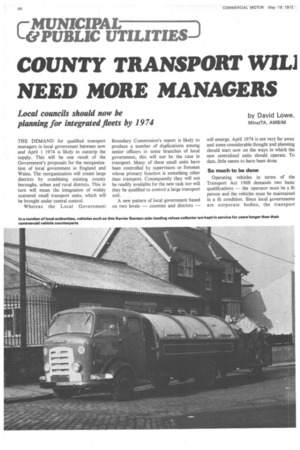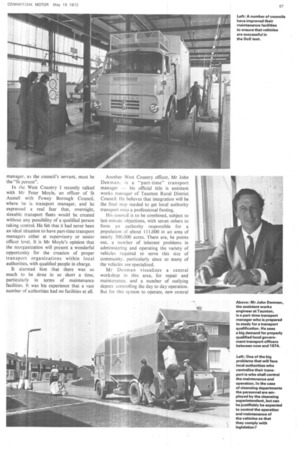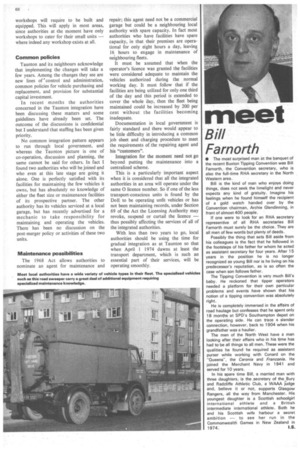COUNTY TRANSPORT WIL1
Page 68

Page 69

Page 70

If you've noticed an error in this article please click here to report it so we can fix it.
NEED MORE MANAGERS
Local councils should now be by David Lowe, planning for integrated fleets by 1974 MInstTA, AMBIM
THE DEMAND for qualified transport managers in local government between now and April 1 1974 is likely to outstrip the supply. This will be one result of the Government's proposals for the reorganization of local government in England and Wales. The reorganization will create large districts by combining existing county boroughs, urban and rural districts. This in turn will mean the integration of widely scattered small transport units, which will be brought under central control.
Whereas the Local Government Boundary Commission's report is likely to produce a number of duplications among senior officers in some branches of local government, this will not be the case in transport. Many of these small units have been controlled by supervisors or foremen whose primary function is something other than transport. Consequently they will not be readily available for the new task nor will they be qualified to control a large transport unit.
A new pattern of local government based on two levels — counties and districts — will emerge. April 1974 is not very far away and some considerable thought and planning should start now on the ways in which the new centralized units should operate. To date, little seems to have been done.
So much to be done Operating vehicles in terms of the Transport Act 1968 demands two basic qualifications — the operator must be a fit person and the vehicles must be maintained in a fit condition. Since local governments are corporate bodies, the transport manager, as the council's servant, must be the "fit person".
In the West Country I recently talked with Mr Peter Moyle, an officer of St Austell with Fowey Borough Council, where he is transport manager, and he expressed a real fear that, overnight, sizeable transport fleets would be created without any possibility of a qualified person taking control. He felt that it had never been an ideal situation to have part-time transport managers either at supervisory or senior officer level. It is Mr Moyle's opinion that the reorganization will present a wonderful opportunity for the creation of proper transport organizations within local authorities, with qualified people in charge.
It alarmed him that there was so much to be done in so short a time, particularly in terms of maintenance facilities. It was his experience that a vast number of authorities had no facilities at all. Another West Country officer, Mr John Denman, is a "part-time" transport manager — his official title is assistant works manager of Taunton Rural District Council. I-le believes that integration will be the final step needed to get local authority transport onto a professional footing.
His council is to be combined, subject to last-minute objections, with seven others to form an authority responsible for a population of about 111,000 in an area of nearly 300,000 acres. There are, he points out, a number of inherent problems in administering and operating the variety of vehicles required to serve this size of community, particularly since so many of the vehicles are specialized.
Mr Denman visualizes a central workshop in this area, for repair and maintenance, and a number of outlying depots controlling the day to day operation. But for this system to operate, new central workshops will require to be built and equipped. This will apply in most areas, since authorities at the moment have only workshops to cater for their small units — where indeed any workshop exists at all.
Common policies Taunton and its neighbours acknowledge that implementing the changes will take a few years. Among the changes they see are new lines of -control and administration, common policies for vehicle purchasing and replacement, and provision for substantial capital investment.
In recent months the authorities concerned in the Taunton integration have been discussing these matters and some guidelines have already been set. The outcome of the discussions is confidential but I understand that staffing has been given priority.
No common integration pattern appears to run through local government, and whereas the Taunton picture is one of co-operation, discussion and planning, the same cannot be said for others. In fact I found two authorities who will be joined and who even at this late stage are going it alone. One is perfectly satisfied with its facilities for maintaining the few vehicles it owns, but has absolutely no knowledge of either the fleet size or maintenance facilities of its prospective partner. The other authority has its vehicles serviced at a local garage, but has recently advertised for a mechanic to take responsibility for maintaining and operating the vehicles. There' has been no discussion on the post-merger policy or activities of these two units.
Maintenance possibilities The 1968 Act allows authorities to nominate an agent for maintenance and
repair; this agent need not be a commercial garage but could be a neighbouring local authority with spare capacity. In fact most authorities who have facilities have spare capacity, in that their premises are operational for only eight hours a day, leaving 16‘ hours to engage in maintenance of neighbouring fleets.
It must be assumed that when the operator's licence was granted the facilities were considered adequate to maintain the vehicles authorized during the normal working day. It must follow that if the facilities are being utilized for only one third of the day and this period is extended to cover the whole day, then the fleet being maintained could be increased by 200 per cent without the facilities becoming inadequate.
Documentation in local government is fairly standard and there would appear to be little difficulty in introducing a common job sheet and charging procedure to meet the requirements of, the repairing agent and his "customers".
Integration for the moment need not go beyond putting the maintenance into a centralized scheme.
This is a particularly important aspect when it is considered that all the integrated authorities in an area will operate under the same 0 licence number. So if one of the less transport-conscious units is found by the DoE to be operating unfit vehicles or has not been maintaining records, under Section 69 of the Act the Licensing Authority may revoke, suspend or curtail the licence — thus possibly affecting the services of all of the integrated authorities.
With less than two years to go, local authorities should be using the time for gradual integration as at Taunton so that when April 1 1974 dawns at least the transport department, which is such an essential part of their services, will be operating smoothly.




























































































































